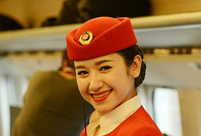 Luoyang aims to become 'Chinese Culture City'
Luoyang aims to become 'Chinese Culture City'
 Century-old jade disc found confirms ancient legend
Century-old jade disc found confirms ancient legend
 A serious mind behind Chinese leader
A serious mind behind Chinese leader
 Panda Cubs to Predict 2014 World Cup Winners
Panda Cubs to Predict 2014 World Cup Winners
 China Southern Airlines flight attendants win titles in service contest
China Southern Airlines flight attendants win titles in service contest
 Pupil's performance art persuades people to stop smoking
Pupil's performance art persuades people to stop smoking
 Nie Chenxi's clay tigers
Nie Chenxi's clay tigers
 Children's Day wishes
Children's Day wishes
 Chinese Kung Fu charms Silicon Valley
Chinese Kung Fu charms Silicon Valley
 Tranquil Yankou ancient town
Tranquil Yankou ancient town
WASHINGTON, June 15 -- U.S. President Barack Obama is in a tough spot as Islamic militants sweep across northern Iraq, overtaking two major cities as tens of thousands of Iraqi government troops reportedly abandon their posts.
Fighters from the Sunni group Islamic State of Iraq and the Levant (ISIL) are reportedly beheading victims in a bid to instill fear as they sweep through the country's north, and have vowed to attack the national capital city of Baghdad.
The mayhem puts Obama in a sticky position. After more than a decade of wars in the Middle East, trillions of taxpayer dollars spent and the deaths of nearly 5,000 U.S. troops, war-weary Americans are wary of more involvement in the volatile region.
But at the same time, foreign policy circles fret that Islamic radicals could gain a foothold in a country they could use as a base to launch terror strikes against the U.S., as al-Qaeda did when it used Afghanistan as a launching pad to strike New York and Washington on Sept. 11, 2001.
Obama said Friday he would decide in the days ahead whether to use U.S. military force to hold off the tide of radicals, although he ruled out putting U.S. boots on the ground.
"This poses a danger to Iraq and its people and, given the nature of these terrorists, it could pose a threat eventually to American interests as well," said Obama, adding that his security team would provide "a range of other options."
But despite promises not to use U.S. ground forces, any type of U.S. involvement in the embattled country, even if just from the air, will undoubtedly spark concern from critics who fret an air campaign could be the first action that will suck the U.S. into yet another Mideastern conflict.
Some observers argued that scenario is unlikely, as the president is concerned about his legacy at this stage of his presidency and wants to be known as the president who ended U.S. involvement in Iraq.
But others worry an air campaign could set the stage for the next administration to ramp up military involvement in Iraq.
Indeed, air attacks are not a complete solution to ending militants' advances, and beating back the radicals will take a complex effort requiring ground forces, experts said.
"As the president suggested, air strikes against ISIL without a ground game would not be all that effective," Wayne White, former deputy director of the State Department's Middle East Intelligence Office, told Xinhua.
Indeed, airstrikes would have to be accompanied by Iraqi forces ready to stand and fight, as well as efforts on the part of Nouri al-Maliki, the Shiite prime minister of Iraq, to guarantee greatly improved treatment of the Sunni Arab community by authorities in Baghdad, White said.
Such a political strategy could be used to win back key Sunni Arab tribes and constituencies so alienated by Maliki's harsh policies toward them that they either support ISIL or opt to stand aside and allow the militants to operate in their areas of influence, White said.
But securing such concessions will be tough, as years of broken promises of fairness have left Maliki with little credibility, he added.
While Washington is eyeing events in Iraq with growing concern, some experts said ISIL's moves in Iraq pose no direct threat to the U.S., at least for now.
Moreover, White argued that ISIL's urban gains may have largely run out of steam, and further penetration into major northern population centers would require militants to move against far more Kurdish, Turcoman and Christian areas. Militants would also face elements of the Kurdish Peshmerga militia, which would likely fight hard to defend its home turf, White said.
Farther south, from the northern neighborhoods of Baghdad down to the Persian Gulf, the population is predominantly Shiite, and further moves by the rebels would involve fighting Shiite Iraqi Army units and tough remobilized militias such as the Mahdi Army also now defending their sectarian turf, he noted.
Baghdad, which had a substantial Sunni Arab population through 2005, shifted toward a far more Shiite city as a result of the ugly sectarian cleansing of 2006-2008.
If the U.S. does take military action, experts said U.S. forces need to tread lightly and carefully, and that the U.S. should target ISIL and not Sunni Arab populations as a whole.
"We (the U.S.) cannot afford to be perceived largely as helping Maliki to carry out his politically destructive anti-Sunni Arab ethnic agenda," White said. "This means a very careful assessment of targeting data, and the avoidance of the destruction of important Sunni Arab real estate -- especially in heavily populated areas."
 Attendants shine at Xinjiang-Lanzhou high-speed rail
Attendants shine at Xinjiang-Lanzhou high-speed rail Jiuzhai Valley - fairyland of the world
Jiuzhai Valley - fairyland of the world Can't take eyes off national teams in World Cup
Can't take eyes off national teams in World Cup Beijing strips off to celebrate summer
Beijing strips off to celebrate summer
 Traditional wedding ceremony of China's Buyi ethnic group
Traditional wedding ceremony of China's Buyi ethnic group Art school students present works in Nanjing
Art school students present works in Nanjing Xinjiang's first high-speed railway goes on trial run
Xinjiang's first high-speed railway goes on trial run 3D Sea-life Themed Art Garage unveiled in Zhengzhou
3D Sea-life Themed Art Garage unveiled in Zhengzhou
 A glimpse of beautiful ladies in Chinese women's fitness team
A glimpse of beautiful ladies in Chinese women's fitness team
 Top 20 hottest women in the world in 2014
Top 20 hottest women in the world in 2014  Grandpa Kang takes Gaokao for 14th time
Grandpa Kang takes Gaokao for 14th time Incredible animal migration in Xinjiang
Incredible animal migration in Xinjiang  College girl proposes to boyfriend on Weibo
College girl proposes to boyfriend on Weibo China's top 10 representative architectures announced
China's top 10 representative architectures announced Chinese warships set sail to U.S. to join 2014 navy drill
Chinese warships set sail to U.S. to join 2014 navy drillDay|Week|Month